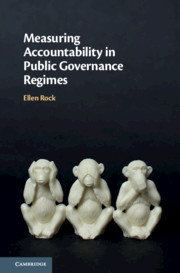Refine search
Actions for selected content:
9 results
11 - Mapping Out a System in Practice
- from Part III - The Complexity of Accountability Systems
-
- Book:
- Measuring Accountability in Public Governance Regimes
- Published online:
- 28 September 2020
- Print publication:
- 01 October 2020, pp 241-272
-
- Chapter
- Export citation
Part I - Accountability Deficits and Overloads
-
- Book:
- Measuring Accountability in Public Governance Regimes
- Published online:
- 28 September 2020
- Print publication:
- 01 October 2020, pp 11-36
-
- Chapter
- Export citation
Introduction
-
- Book:
- Measuring Accountability in Public Governance Regimes
- Published online:
- 28 September 2020
- Print publication:
- 01 October 2020, pp 1-10
-
- Chapter
- Export citation
9 - Features in Balance
- from Part III - The Complexity of Accountability Systems
-
- Book:
- Measuring Accountability in Public Governance Regimes
- Published online:
- 28 September 2020
- Print publication:
- 01 October 2020, pp 217-225
-
- Chapter
- Export citation
Part III - The Complexity of Accountability Systems
-
- Book:
- Measuring Accountability in Public Governance Regimes
- Published online:
- 28 September 2020
- Print publication:
- 01 October 2020, pp 213-272
-
- Chapter
- Export citation
1 - Defining Accountability
- from Part I - Accountability Deficits and Overloads
-
- Book:
- Measuring Accountability in Public Governance Regimes
- Published online:
- 28 September 2020
- Print publication:
- 01 October 2020, pp 13-24
-
- Chapter
- Export citation
10 - Relationship Dynamics in the System
- from Part III - The Complexity of Accountability Systems
-
- Book:
- Measuring Accountability in Public Governance Regimes
- Published online:
- 28 September 2020
- Print publication:
- 01 October 2020, pp 226-240
-
- Chapter
- Export citation
Conclusion
-
- Book:
- Measuring Accountability in Public Governance Regimes
- Published online:
- 28 September 2020
- Print publication:
- 01 October 2020, pp 273-277
-
- Chapter
- Export citation

Measuring Accountability in Public Governance Regimes
-
- Published online:
- 28 September 2020
- Print publication:
- 01 October 2020
